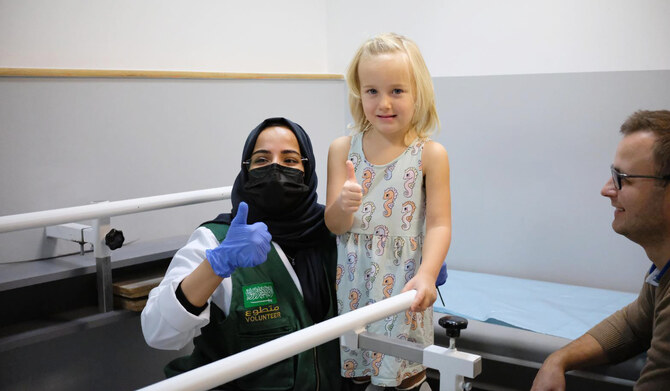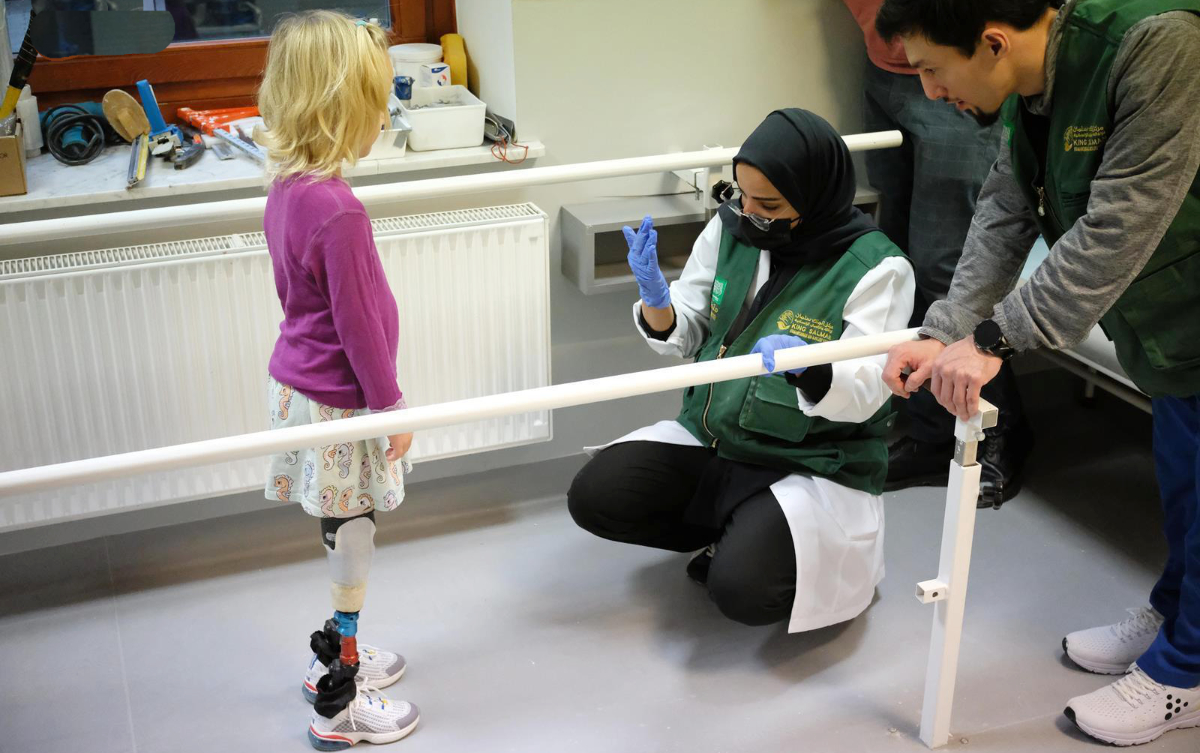RIYADH: US President Donald Trump, who is making his first foreign visit starting with Saudi Arabia, will arrive here today to hold talks with King Salman on a range of key issues, including Iran, Syria, Yemen, terrorism, the Middle East peace process, as well as ways and means to further strengthen Saudi-US ties.
Trump will attend three high-profile summits during his stay in Riyadh, including a GCC-US Summit and an Arab-Islamic-US Summit on Sunday.
“President Trump’s visit to the Kingdom is very important in the shared goal and efforts to fight terrorism and bring safety, and stability in the Middle East,” said member of the Shoura Council Mona A. Almushait here Friday.
“Trump’s meetings in Riyadh are essential to our national security and to the global stability, particularly because there will be discussions on measures to take to confront the Iranian aggression,” she added.
Almushait said that “Saudi Arabia, the largest stable economy in the Middle East, is characterized by its active membership in the club of G-20 states.”
“The Kingdom and the US enjoy strong economic and trade relations supported by common interests,” she said, adding that several agreements are expected to be signed during the US president’s visit.
Trump’s first stop on this first visit abroad is Saudi Arabia, after which he will go to Israel and the occupied Palestinian territories, and Italy.
The eight-day trip will also see him go to attend the NATO Summit in Belgium and the G-7 Summit of major industrial nations, to be held in Italy.
Almushait said: “I am delighted that President Trump is visiting Saudi Arabia. This is the first time a US president has chosen a Muslim nation for his first foreign trip, a gesture that demonstrates America’s commitments to and support for Muslim nations,” she added.
“I would also like to mention that we have an active Saudi-American Friendship Committee in the Shoura Council that aims and strives to further strengthen the relationship between Saudi Arabia and the US, and enhance the understanding between the two counties,” she said.
Reinforcing the belief that the visit of the US president to Saudi Arabia is significant, German Ambassador Dieter W. Haller said: “Trump’s visit is very important for the security architecture in the region, and underlines the pivotal role the Kingdom is playing in the region.
“I understand that the fight against terrorism and extremism will be the main focus of the visit and this is very good news,” said Haller.
He added: “We can only fight terrorism successfully if we all — Arabs, Muslims and non-Muslims, Europeans, Americans — stand together.
“International security cooperation but also the joint fight against extremist ideas require the bundling of all our efforts,” said the German envoy, adding that these issues were also the focus of discussions during the recent visit of German Chancellor Angela Merkel to Saudi Arabia.
Emphasizing the need for strong international collaboration with the Muslim world to fight the menace of terrorism, Portuguese Ambassador Manuel Carvalho said: “I hope the very significant meetings President Trump will have in Riyadh will create the foundation for a better mutual understanding for all involved and for a stronger action in confronting the common challenges, including terrorism and regional instability.”
Carvalho’s views were echoed by Turkish Ambassador Yunus Demirer, who welcomed the fact that the Arab-Islamic-US Summit will be held in Riyadh during the US president’s visit.
Demirer said that “Turkey stands with Saudi Arabia, the US and its allies in the Muslim world for unified efforts to fight terror and terrorist groups.”
He said that “Ankara supports the aims and objectives of the Arab-Islamic-US Summit, which seeks to work toward the establishment of a new partnership to confront extremism and terrorism, and reinforce the values of tolerance and coexistence.”
Trump visit proof of US commitment to Muslim nations: Experts
Trump visit proof of US commitment to Muslim nations: Experts

UK science minister visits King Faisal Specialist Hospital’s heart center

- Peter Kyle meets medical team responsible for world’s first fully robotic heart transplant
- Visit follows global recognition of KFSHRC’s medical standing, groundbreaking innovations
RIYADH: The United Kingdom’s Secretary of State for Science, Innovation, and Technology visited the King Faisal Specialist Hospital and Research Center in Riyadh on Monday, the Saudi Press Agency reported.
Peter Kyle was shown the hospital’s cardiac facilities, which have pioneered advancements in cardiac care and medical innovation.
Kyle visited the Heart Center of Excellence, where he observed cutting-edge technologies and medical breakthroughs that have positioned KFSHRC as a global leader in specialized healthcare.
He was received by Dr. Hani Al-Sergani, the center's executive director, and his deputy, Prof. Feras Khaliel.
The British official met with the medical team responsible for the world’s first fully robotic heart transplant, a landmark achievement led by Khaliel.
Kyle also reviewed the latest advancements in minimally invasive organ transplantation, which reduce surgical risks and improve patient recovery times.
His visit follows the international recognition of KFSHRC’s medical milestones, particularly after the groundbreaking robotic heart transplant.
KFSHRC ranked first in the Middle East and North Africa region and 15th globally among the world’s top 250 academic medical centers for the second consecutive year.
It was also named the most valuable healthcare brand in Saudi Arabia and the Middle East by Brand Finance 2025, and was included in Newsweek’s World’s Best Smart Hospitals 2025 list.
Canadians helping to deliver Vision 2030, says ambassador

- Saudi reform program ‘will be a tool to bring peace, stability in the broader Middle East,’ says Jean-Philippe Linteau
- Envoy will lead a delegation of Canadian companies working in the Kingdom’s smart and green cities on visit to Madinah
RIYADH: Canadian expatriates are helping Saudi Arabia to deliver Vision 2030 at various levels, as the two countries continue to enjoy closer ties, according to the Canadian ambassador to the Kingdom.
Jean-Philippe Linteau underlined the growth in relations between the two countries, describing these as the “core” of diplomatic ties, during celebrations for National Flag Day of Canada in Riyadh on Sunday.
The ambassador told Arab News that more than 14,000 Canadians are now living and working in the Kingdom.
“These Canadians are working in the private sector, they are CEOs, they are in mid-management, they work in government, in universities — you find them everywhere,” he said.
“The Canadians are here helping to deliver on the Vision.”
Linteau expressed how proud he is to see Canadians supporting Vision 2030, saying that it will deliver “a bright future for all Saudis, and will also be a tool to bring peace and stability in the broader Middle East.”
During his interview, the ambassador also extended a message to the “tens of thousands of (Saudi) alumni” of Canadian universities saying: “Canada is your second home and you are always welcome there.”
The ambassador gave the opening remarks during Canadian Flag Day, speaking about how relations between the two countries are growing, adding that many Saudis have a connection to Canada and vice versa through education, work, and tourism.
Saudi Arabia and Canada restored ties in May 2023 following talks between Saudi Crown Prince Mohammed bin Salman and Canadian Prime Minister Justin Trudeau at the Asia-Pacific Economic Cooperation Forum in Bangkok in November 2022.
During his remarks, Linteau also announced that he will lead a delegation of Canadian companies working in the Kingdom’s smart and green cities on a visit to Madinah.
“Following my earlier visit to Madinah we decided to take them to see how the holy cities are changing and becoming a tourist hub and a tourist attraction, and how much there are opportunities to work together to make these cities more green and sustainable,” he said.
As a part of Flag Day festivities, the Embassy of Canada hosted a photo exhibition titled “Unceded” celebrating the culture, heritage, and lives of the indigenous peoples of Canada.
“As Canada comes to grip with its colonial past, this exhibition is about our commitment to reconciliation, cultural preservation, and fostering deeper understanding across nations,” Linteau said.
Flag Day also celebrates the national symbol of Canada, the maple leaf, which was adopted on the flag and raised for the first time 60 years ago over Parliament Hill.
“Flag Day is about celebrating our national symbol, the maple leaf. In 1965, Canada adopted the maple leaf in the flag that you know today,” the envoy said.
The maple leaf “is a symbol that unites Canadians and reflects their common values of democracy, inclusion, and equality,” he added.
Saudi designers transform traditional handcrafts into high fashion

- Competition winners to display their work at Saudi Cup exhibition
- Techniques include hand embroidery, natural dyeing, leatherwork
RIYADH: A fusion of tradition and innovation stole the spotlight at the Traditional Handcrafts Revival in Saudi Fashion competition on Sunday, where local designers used age-old techniques to craft high-fashion pieces.
Held at Mansard Hotel – The Gallery in Riyadh, the event celebrated 10 winners whose designs honored the Kingdom’s rich cultural identity through embroidery, natural dyeing, leatherwork, and even 3D printing.

The winning designs will be showcased at the Fashion Commission’s exhibition during the Saudi Cup 2025 this weekend.
Burak Cakmak, CEO of the Fashion Commission, highlighted the initiative’s role in promoting Saudi Arabia’s culture.
HIGHLIGHTS
• The winning designs will be showcased at the Fashion Commission’s exhibition during the Saudi Cup 2025 this weekend.
• ‘Sidrat Najd’ by Maha Al-Qahtani is an ethereal gown that integrates sidr fruit kernels, covered with silver leaves and Swarovski crystals.
“The ‘Traditional Handcrafts Revival in Saudi Fashion’ initiative is a program designed to promote traditional Saudi attire within the contemporary fashion industry.
“It emphasizes Saudi cultural heritage, enhances and preserves Saudi cultural identity, and fosters local talent in creative design,” he told Arab News.

Cakmak added: “By emphasizing Saudi culture at the forefront of the competition, we were able to foster creative talent to create new designs showcasing the vast heritage of Saudi in alignment with the Ministry of Culture’s ‘Year of Handicrafts.’”
Rand Al-Saif’s winning design, “Saudiya,” is a five-piece ensemble showcasing intricate hand embroidery, natural dyeing, and traditional leatherwork — techniques deeply rooted in Saudi Arabia history.
“My design, ‘Saudiya,’ is inspired by the desert of Hijaz and Tihama,” Al-Saif said.
In second place was “Sidrat Najd” by Maha Al-Qahtani. Her ethereal gown integrates sidr fruit kernels, covered with silver leaves and Swarovski crystals.
“The name of my design is ‘Sidrat Najd,’ inspired by the sidr tree, which holds deep cultural significance in Saudi heritage,” she explained.
Third was “Bride of the Arabian Peninsula” by Ghaida Majdali, who took a bold and innovative approach.
“The fabric was worked on for 350 hours of hand embroidery, without any machine. The skirt is made of metal with 3D printing, covered in natural camel leather,” she said.
Ukrainian child finds hope in KSrelief prosthetics center

- The prosthetic limbs and rehabilitation center reflects the Kingdom’s pioneering role in international humanitarian work
RIYADH: When Matilda, an 8-year-old Ukrainian girl confined to a wheelchair, visited a prosthetic limbs center in Poland affiliated with Saudi aid agency KSrelief, it was with hope for the future.
Before the war in Ukraine, Matilda was like any other child, full of life and laughter, playing in the alleys of her village. However, in an instant, her life changed irrevocably. The war tragically resulted in the amputation of both her legs below the knees. This sudden transformation from an active, energetic child to one facing an uncertain future was devastating.
Matilda’s parents were struck with shock and despair as their daughter faced a life-altering loss of mobility, unable to walk, play, or even sit comfortably. The sudden change weighed heavily on her physical and mental health.

Overwhelmed by financial burdens and uncertainty, the family found a glimmer of hope when KSrelief announced its prosthetic limbs program, offering rehabilitation services to victims of war and disaster.
Matilda’s parents learned about this vital program, targeting those affected by the war in Ukraine residing in Poland. Upon learning that the Polish Ministry of Health had included their daughter on the list of eligible amputees, they finally saw a glimmer of hope.
Her journey to regain her life began with a complex logistical process that brought her to the prosthetics center in Poland. Greeted by the warm smiles of the medical team, she felt hope that the pain would soon begin to subside. A comprehensive medical assessment was conducted, and a detailed medical file was created, outlining a personalized treatment plan that considered Matilda’s physical and psychological needs.
FASTFACT
Ukrainian child Matilda has a chance at a better future with KSrelief’s prosthetic limbs program that offers rehabilitation services to victims of war and disaster.
This plan carefully assessed the level and type of amputation, the characteristics of the remaining limbs, and most importantly, Matilda’s goals, expectations, and desires. The Saudi medical team reassured Matilda, explaining the journey ahead and emphasizing that this center was more than just a medical facility; it was a place dedicated to restoring lives.
Before the prosthetic limbs were fitted, Matilda underwent a rigorous rehabilitation program focused on strengthening her muscles, improving her balance, and alleviating the pain associated with the amputation.
Matilda’s journey with the prosthetics center, managed by a team of dedicated Saudi specialists, marked the beginning of her recovery. The multidisciplinary team included orthopedic and rehabilitation doctors, prosthetic limb specialists, and experienced physiotherapists. The team also included dedicated volunteers who provide essential support services, including logistics and organizing activities within the rehabilitation centers.
In Matilda’s case, the specialized team determined the final measurements and selected the appropriate materials for her prosthetics based on her individual needs and condition. After the manufacturing process was complete, Matilda entered a pre-installation rehabilitation phase. The team also provided invaluable guidance on coping with the amputation and adapting to the changes in her body and life.
After weeks of evaluation and rehabilitation, the day Matilda had been eagerly anticipating, yet also dreading, finally arrived. With the assistance of the team, she stood for the first time with both prosthetic limbs in place. Step by step, she began the journey of regaining her balance, learning to walk again, and reclaiming the life she thought she had lost.
The specialized team also provided crucial psychological support, helping her accept her new body and build her self-confidence. They diligently trained her on how to use her prosthetic limbs in everyday activities, from walking and running to playing games.
Matilda underwent regular follow-up sessions to ensure a smooth transition and adaptation to her new life with the prosthetics. Gradually, she regained her independence, no longer reliant on others for assistance.
The prosthetic limbs and rehabilitation center reflects the Kingdom’s pioneering role in international humanitarian work. Recognizing the critical importance of alleviating human suffering and enabling individuals to live dignified lives, the Kingdom, through KSrelief, implements and expands humanitarian and relief projects.
The center prioritizes localizing and improving prosthetic limb services and rehabilitation programs, while also building the capacities of local health institutions to ensure the sustainability of these vital services.
KSrelief adopts a meticulous approach to selecting and classifying beneficiaries for the prosthetic limbs and rehabilitation program. The selection process relies on lists of amputation patients provided by the Ministry of Health in the respective countries where the project is implemented.
Priority is given to amputation patients resulting from direct war injuries, mines, or the remnants of war, encompassing all age groups, children under the age of 18 suffering from motor disabilities due to amputation or congenital deformities, and other categories, such as individuals injured in traffic accidents or those affected by various diseases.
The program empowers target groups by providing them with the opportunity to reintegrate into society and engage in various activities independently. This enhances their economic, social, and psychological well-being. Through its four centers, the program offers free, high-quality services to beneficiaries in countries in critical need, including Yemen, Syria, those affected by the earthquake in Turkiye, and those impacted by the Ukrainian war in Poland.
Since its inception in 2020 through 2024, the program has provided services to over 109,000 beneficiaries, delivering 298,999 free, high-quality services. Moreover, 10,851 modern prosthetic and orthotic limbs were manufactured and fitted. Notably, 98,612 beneficiaries received rehabilitation services.
According to program statistics, female beneficiaries constituted 33 percent, while males comprised 67 percent. Approximately 24 percent of cases stemmed from pathological injuries, while a significant 76 percent resulted from war injuries, including those caused by mines, war remnants, and unexploded ordnance.
Today, Matilda is no longer the little girl who entered the center confined to a wheelchair. She has transformed into a confident young girl walking independently, her eyes filled with hope as she embraces the future.
Matilda’s story is one among countless others that exemplify KSrelief’s commitment to embodying the Kingdom’s message of support for people in need, wherever they may be.
Saudi deputy minister meets Korean official in Muscat

- They reviewed bilateral cooperation on various issues
MUSCAT: Saudi Arabia’s Deputy Minister for International Multilateral Affairs Abdulrahman Al-Rassi met with Eui-hae Cecilia Chung, Korea’s special representative for the Indo-Pacific, at the 8th Indian Ocean Conference in Muscat on Monday.
During the meeting, they reviewed bilateral cooperation on various issues. They also discussed regional and international developments and efforts to address them, the Foreign Ministry wrote on X.
Meanwhile, Prince Saud bin Abdullah bin Jalawi, the governor of Jeddah, received Kuwait’s Consul General in Jeddah Yousef Al-Tunaib on Monday.
During their meeting, they discussed various topics of common interest, the Saudi Press Agency reported.



















